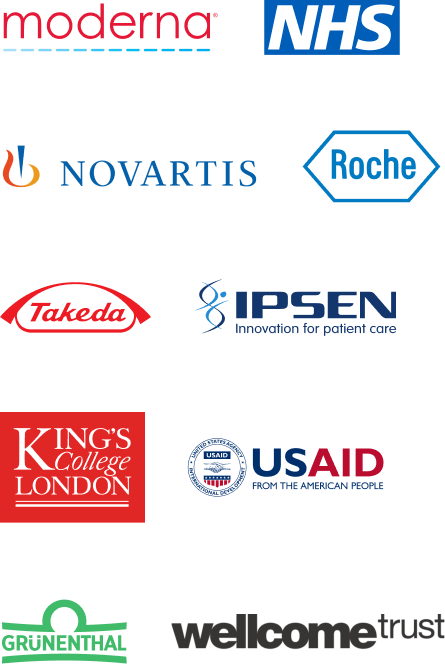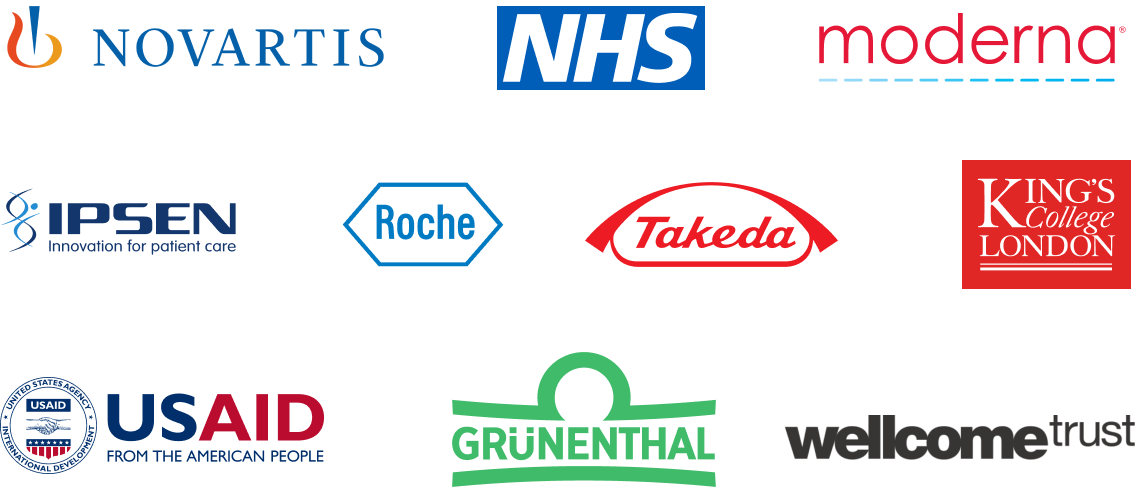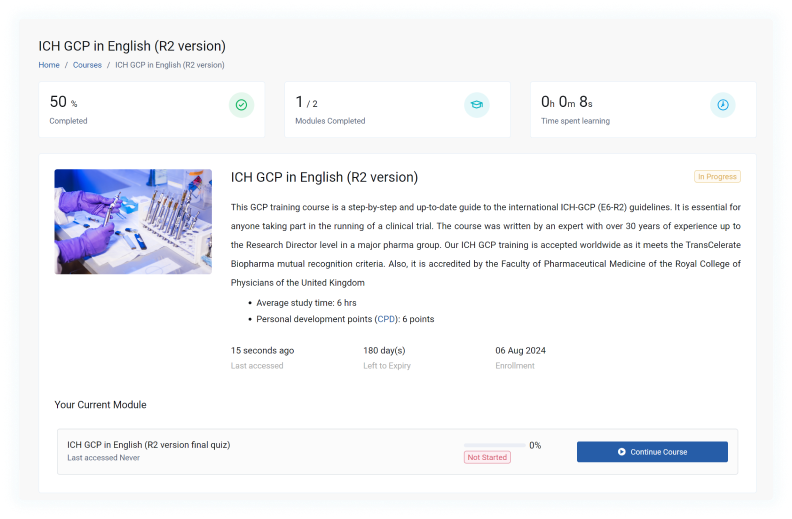Course Syllabus
- Introduction
- What is GCP?
- Why should there be ICH GCP?
- ICH GCP Principles
- Some Basic Approaches
- Documentation and Version Control
- Quality Assurance (QA)
- Other Resources
- Introduction
- Responsibilities of the CA
- Responsibilities of the IEC
- Subject Informed Consent Forms (ICF): Part 1
- Subject Informed Consent Forms (ICF): Part 2
- Composition, Functions, Operations, Procedures, and Records
- Introduction
- Investigator Responsibilities
- Investigator Qualifications and Agreements
- Adequate Resources
- Medical Care of Trial Subjects: Part 1
- Medical Care of Trial Subjects: Part 2
- Communication with IRB/IEC
- Compliance with the Protocol
- Investigational Medicinal Products
- Randomisation Procedures and Un-blinding
- Informed Consent: Introduction
- Informed Consent: The Consent Discussion
- Informed Consent: Subjects Who Cannot Read or Write
- Informed Consent: Minors and “Mentally Incompetent” Subjects
- Informed Consent: Incapacitated Subjects
- Informed Consent: Updating Consent
- Records and Reports: Introduction
- Records and Reports: Study Site Files
- Records and Reports: Updates & Amendments
- Records and Reports: Source Documents
- Records and Reports: Financial Information
- Records and Reports: The Case Record Form
- Records and Reports: Recording Subject Data
- Premature Termination or Suspension of a Trial
- Progress Reports and Final Reports by Investigator
- Introduction
- Quality Management: Part 1
- Quality Management: Part 2
- QA and QC (Quality Assurance and Quality Control): Introduction
- QA and QC (Quality Assurance and Quality Control): Standard Operating Procedures
- QA and QC (Quality Assurance and Quality Control): Agreements & Contracts
- Contract Research Organisations
- Medical Reports
- Trial Design
- Trial Management
- R2 Modifications
- Electronic Data Systems
- Record Keeping
- Investigator Selection: Introduction
- Investigator Selection: Permissions
- Investigator Selection: Responsibilities
- Investigator Selection: Compensation
- Financing
- Notification/ Submission to Regulatory Authorities
- Gaining CA Approval in the EU: Part 1
- Gaining CA Approval in the EU: Part 2
- Confirmation of Review by IRB/IEC
- Information on IMP
- Manufacturing, Packaging, Labelling, and Coding Investigational Products: Part 1
- Manufacturing, Packaging, Labelling, and Coding Investigational Products: Part 2
- Supplying and Handling Investigational Products
- Record Access
- Audit and Inspection
- Noncompliance
- Premature Termination or Suspension of a Trial
- Clinical Trial/Study Reports
- Multicentre Trials
- Introduction
- Monitoring: Introduction
- Monitoring: Monitor Responsibilities
- Monitoring: IMP Inspection
- Complying with the Protocol, Amendments, SOP and Guidance
- Verifying Informed Consent
- The Case Record Form (CRF) and Source Documents
- Verifying Subject Data
- Errors in Subject Data Recording Notebooks
- Closing out the Monitoring Visit
- The Monitoring Report & Plan
- Quality Management - Centralised Monitoring
- Fraud and Misconduct
- Introduction
- Reporting Adverse Drug Reactions: Adverse Events
- Reporting Adverse Drug Reactions: Serious Adverse Events
- Adverse Drug Reaction Reports
- Adverse Reactions of Special Events
- Periodic Safety Reports
- Reporting of Adverse Drug Reactions
- Introduction
- Protocol Structure and Content
- Introduction
- Investigator Brochure Structure and Content
- Introduction
- Essential Documents
- Archiving
- Documents to be Present Pre-Study
- Documents to be Present During the Study
- Documents to be Present Post-Study
- Glossary & Abbreviations
- Further Resources
Our GCP certified customers


Good Clinical Practice (GCP) training is a vital educational programme designed to arm clinical trial professionals and researchers with crucial knowledge about ethical and scientific standards essential for conducting top-notch clinical trials. This thorough training encompasses the globally acknowledged guidelines set forth by the International Council for Harmonisation (ICH).
The core objectives of GCP training include:
Safeguarding the rights, safety, and welfare of human participants
Upholding the accuracy and dependability of clinical trial data
Fostering uniform, superior practices across all facets of clinical research
The Whitehall Training Good Clinical Practice Course thoroughly explores these pivotal areas, offering learners a robust grounding in both the theoretical principles and practical implementation of Good Clinical Practice.
For professionals aiming to engage in clinical trial research, obtaining GCP certification is essential.
If you're keen to broaden your knowledge in this field, GCP certification offers significant advantages:
It guarantees adherence to global standards
It boosts the credibility and calibre of research
It safeguards the rights and well-being of study participants
It enhances career opportunities within clinical research
The Whitehall Training GCP course not only provides you with certification but also imparts practical knowledge, enabling you to effectively implement GCP principles in your day-to-day work. This combination of theoretical understanding and hands-on application makes our course particularly valuable for those seeking to excel in clinical research.
GCP certification is crucial for numerous roles within the clinical research field:
Lead Researchers and Co-investigators: Those with primary responsibility for overseeing and conducting trials at research facilities.
Clinical Study Team Members: This encompasses research assistants, clinical nurses, and other on-site personnel involved in managing the day-to-day aspects of trials.
Trial Sponsors and Research Organisations: Individuals responsible for the planning, initiation, and documentation of clinical studies.
Regulatory Body Representatives: Officials tasked with assessing and ensuring trial compliance with established standards.
Research Ethics Committees: Panellists who review and grant approval for trial protocols.
University and Research Centre Staff: Those ensuring that institutional research adheres to international guidelines.
Researchers Funded by the National Institute for Health and Care Research (NIHR): All investigators and team members involved in NIHR-supported clinical trials.
The Whitehall Training Good Clinical Practice Course is designed to meet the needs of this broad spectrum of professionals, offering both universal GCP principles and role-specific guidance.
Additionally, this course proves beneficial for individuals seeking to enhance their research capabilities and streamline their clinical trial operations.
Our Good Clinical Practice (GCP) training programme is a comprehensive guide to the ICH-GCP (E6-R2) international guidelines. It fulfils the training requirements for those wishing to participate in international clinical trials. The course offers a detailed, step-by-step approach to understanding and implementing these crucial guidelines, making it indispensable for anyone involved in clinical trial management.
Developed by an industry veteran with over three decades of experience, including a stint as Research Director at a major pharmaceutical company, this course brings unparalleled expertise to your fingertips. Its global recognition is underscored by its compliance with TransCelerate Biopharma's mutual recognition criteria and accreditation from the Faculty of Pharmaceutical Medicine of the Royal College of Physicians in the UK.
To cater to a diverse audience, we offer the course in multiple languages beyond English, including German, Bulgarian, French, Italian, Japanese, Polish, Portuguese, Russian and Spanish. Furthermore, we've developed region-specific versions tailored to the unique regulatory landscapes of Australia, the UK, the US, France, Germany and Latin America.
The course boasts a user-friendly design with clear, visually engaging content that allows for easy reference to the ICH-GCP E6 document. It goes beyond theory, offering practical insights into GCP application drawn from real-world experience. As an added benefit, participants can earn 6 Continuing Professional Development (CPD) points upon completion, further enhancing their professional credentials.
In essence, this course offers a blend of comprehensive content, practical insights, and global recognition, making it an ideal choice for professionals seeking to excel in clinical trial management.
Indeed. Our GCP courses have received accreditation from The Faculty of Pharmaceutical Medicine of the Royal College of Physicians: Established in 1989, this professional organisation for UK pharmaceutical physicians is renowned for its stringent research standards.
These certifications validate that our courses meet exacting industry and academic criteria, providing you with a qualification that is broadly acknowledged across the sector.
The price of GCP certification can fluctuate based on several key factors:
Official recognition: Has the course been endorsed by credible bodies?
International compliance: Does the training meet ICH standards, allowing for participation in global clinical studies?
Content quality: Is the material current and authored by industry professionals?
Duration of availability: For how long can students access the course materials?
Our Good Clinical Practice course at Whitehall Training is priced at £79, reflecting its:
Official recognition: Our courses have earned accreditation from the Royal College of Physicians, offering learners 6 official CPD points from the Faculty of Pharmaceutical Medicine.
International compliance: Upon completion, researchers are equipped to engage in clinical trials, in line with ICH E6(R2) guidelines.
Content quality: The course is crafted by our GCP specialist, Lucy Parker, who brings over ten years of experience managing research across major institutions, including the NHS.
Duration of availability: To facilitate ongoing professional development, we provide unlimited access to our course resources.
For group purchases, we offer a 10% discount on orders of 5 licences at checkout. If you're interested in bulk orders, please reach out to our team for additional savings options.
Indeed, some GCP training options can be found without charge, but it's important to be aware of their potential drawbacks:
The content may lack accreditation and could be outdated
Typically, no formal certification is awarded, which means participants may not be qualified to undertake clinical research
However, these complimentary courses can serve a purpose. They may offer a rudimentary introduction to the fundamentals of Good Clinical Practice and its core concepts for those seeking a basic overview.
It's worth noting that our Whitehall Training Good Clinical Practice Course provides comprehensive, accredited training with official certification upon completion. This ensures that learners are fully prepared and qualified for clinical research roles.
Whitehall Training offers a Good Clinical Practice (GCP) course that aims to equip participants with a robust understanding of the essential principles and practices needed for conducting ethical and scientifically valid clinical trials. The programme is structured to accommodate learners at various levels, featuring both basic and more advanced content.
The course curriculum encompasses a wide range of crucial topics, including:
- The origins and fundamental concepts of GCP
- Defining the duties of investigators, sponsors, and monitors
- Addressing ethical issues and obtaining informed consent
- Creating and following research protocols
- Managing safety reports and adverse incidents
- Ensuring data quality and integrity
- Navigating regulatory landscapes and interacting with authorities
- Maintaining crucial documentation and records
- Properly handling investigational medicinal products
- Implementing effective site management and monitoring techniques
To ensure an engaging and productive learning experience, the course utilises a variety of interactive e-learning approaches, such as:
- In-depth educational materials
- Authentic case studies and situational analyses
- Engaging knowledge assessments and quizzes
- Practical illustrations and industry best practices
- Chances for personal reflection and practical application of concepts
This comprehensive approach ensures that participants gain a thorough grounding in GCP, preparing them for the complexities of modern clinical research.
Achieving your Good Clinical Practice (GCP) certificate involves a simple two-stage process:
- Work through our engaging, interactive course materials to complete the learning component.
- Take the online final assessment.
Feeling apprehensive about the GCP examination? There's no need for concern. The test is merely a necessary step to confirm your readiness for research participation. Should you not pass on your first attempt, you can easily revisit our comprehensive resource library to reinforce your understanding of any areas that need improvement, then have another go at the exam.
At Whitehall Training, we've structured our Good Clinical Practice course to ensure participants not only absorb the material but can also implement it effectively in real-world clinical research environments. Our comprehensive assessment approach includes:
- Continuous Learning Checks: As you progress through the modules, you'll encounter interactive quizzes and practical scenarios. These serve to reinforce key concepts and provide immediate feedback on your understanding.
- Comprehensive Final Evaluation: The course concludes with an in-depth examination that thoroughly tests your grasp of GCP principles and their application. This assessment covers all crucial areas, including:
- Ethical protocols in clinical studies
- Adherence to regulatory standards
- Key roles and their responsibilities in trials
- Maintaining data integrity and quality
- Proper handling and reporting of safety concerns
Real-world Application: Several questions in the final evaluation are crafted to assess your ability to apply GCP guidelines to authentic clinical trial situations.
To ensure you're fully equipped to conduct trials, you must successfully complete the final evaluation to receive your GCP certification.
We understand that mastering these concepts may take time, which is why you can attempt the final evaluation as many times as needed. This approach ensures that all participants can achieve the required standard and become GCP qualified at their own pace.
Our Good Clinical Practice (GCP) course is crafted to suit a diverse range of professionals in the clinical research field. Whilst prior knowledge of clinical research can be advantageous, it's not essential for enrolment. We’ve thoughtfully structured the content to accommodate varying levels of expertise and different roles within the clinical trial ecosystem.
This training is particularly beneficial for:
- Research Coordinators in clinical settings
- Lead and Associate Investigators
- Nurses specialising in research
- Professionals managing clinical trials
- Those handling data and conducting biostatistical analysis
- Specialists in regulatory affairs
- Experts in quality assurance
- Members serving on ethics committees
- Pharmacists engaged in clinical trial work
- Personnel from sponsors and Contract Research Organisations (CROs)
Whether you’re just starting your journey in clinical research or seeking to update your existing knowledge, our course offers a thorough exploration of GCP principles and their real-world applications. The curriculum is designed to be accessible and informative, regardless of your current level of experience in the field.
Yes, our Good Clinical Practice (GCP) course is fully accessible online. This digital format offers several benefits to learners:
- Flexible study schedule: You can work through the course content at your own rhythm, fitting your studies around other commitments. This approach allows for a more thorough understanding of the material without the constraints of a fixed timetable.
- Learn anywhere: The course can be accessed round-the-clock from any internet-enabled device. Whether you’re at home, in the office, or on the move, you can continue your learning journey with ease.
This online delivery method ensures that our GCP course is both convenient and adaptable to your individual needs, making it easier for you to gain the necessary knowledge and skills in Good Clinical Practice.
The International Council for Harmonisation, commonly known as ICH, plays a crucial role in shaping global pharmaceutical research standards, including Good Clinical Practice (GCP). Here are some essential points about ICH:
- It’s a collaborative effort involving both regulatory bodies and pharmaceutical industry experts.
- ICH develops and maintains worldwide guidelines for clinical trials.
- Their GCP guidelines are designed to safeguard trial participants and ensure the reliability of research data.
- These guidelines undergo regular updates, with the most recent iteration being ICH GCP E6(R2).
Adhering to these ICH guidelines is essential for conducting clinical trials that meet international standards. This is precisely why we’ve developed our Good Clinical Practice course. Our comprehensive training covers all 13 fundamental ICH GCP principles, equipping you with the knowledge needed to carry out research that aligns with global requirements.
ICH Good Clinical Practice E6 (R2) is the latest iteration of the Good Clinical Practice guidelines, published in 2016 by the International Council for Harmonisation of Technical Requirements for Pharmaceuticals for Human Use (ICH). This update marks a substantial advancement in GCP standards, adapting to the evolving nature of clinical research.
It’s essential for clinical research professionals to be well-versed in ICH GCP E6 (R2) for several reasons:
- It sets the current worldwide benchmark for ethically and scientifically robust clinical trials.
- Regulatory bodies across the globe often mandate adherence to these guidelines.
- It plays a crucial role in safeguarding human participants and ensuring the integrity of trial results.
- Most research institutions and trial sponsors expect their teams and collaborators to be knowledgeable about and compliant with these updated standards.
The Whitehall Training Good Clinical Practice Course offers comprehensive coverage of ICH GCP E6 (R2). Our programme ensures that learners gain a thorough understanding of these revised guidelines and can implement them effectively in their clinical research endeavours.
The International Council for Harmonisation (ICH) Good Clinical Practice (GCP) guidelines are founded on 13 essential tenets that form the ethical and scientific framework for clinical research. These crucial principles encompass:
- Conducting research ethically
- Ensuring benefits surpass potential risks
- Safeguarding participants' rights and wellbeing
- Providing comprehensive supporting information
- Developing protocols based on sound scientific principles
- Obtaining approval from Institutional Review Boards or Independent Ethics Committees
- Ensuring qualified medical oversight
- Employing suitably qualified investigators
- Acquiring informed consent from participants
- Ensuring precise data documentation and reporting
- Maintaining participant confidentiality
- Adhering to good manufacturing practices for investigational products
- Implementing robust quality assurance systems
Our Whitehall Training Good Clinical Practice Course offers comprehensive instruction on these foundational principles, equipping you with the knowledge to effectively implement them in practical clinical research scenarios. By mastering these concepts, you’ll be well-prepared to navigate the complexities of GCP in your professional endeavours.

